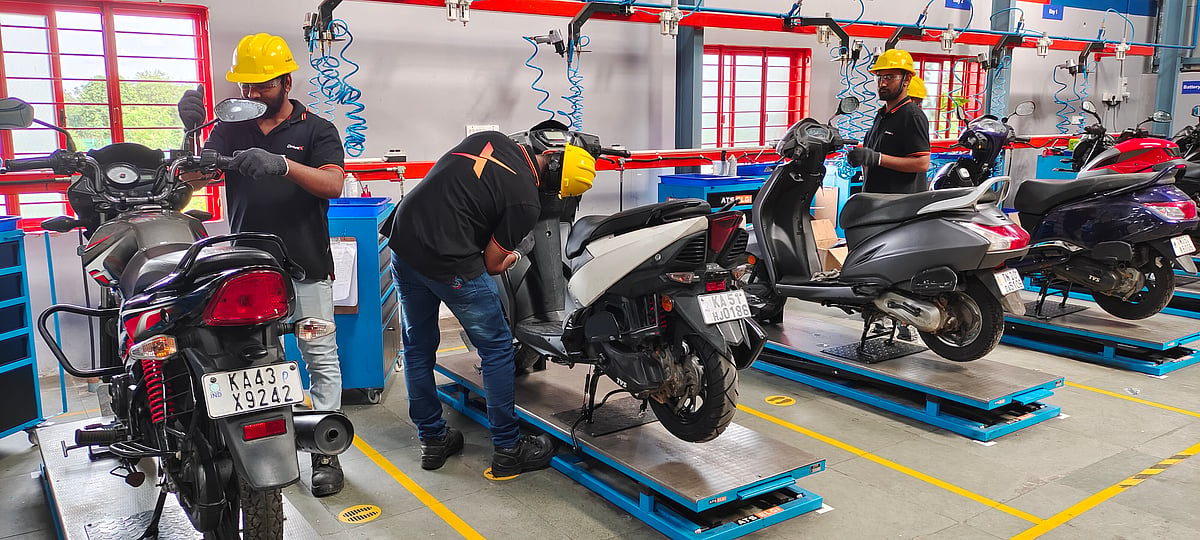By Narain Karthikeyan
The Indian two-wheeler industry achieved remarkable success in 2023. According to a report, the market in November 2023 witnessed a year-on-year growth of 21.08%, with over 3.91 lakh additional two-wheelers compared to the same month last year. This progress was largely supported by propelling factors such as rising disposable incomes, escalating demand for practical commuting solutions due to rapid urbanization, availability of easy finance options, multiple product choices, reliable technology features, and others. While the current growth this year was promising, it doesn’t stop here.
Continuing the upward trajectory, it is anticipated that the two-wheeler market size in the country will reach 86.4 million units by 2032, exhibiting a growth rate (CAGR) of 16.29% during 2024-2032. Buoyed by increased sales and positive projections, the industry is gearing up to cater to the rising demand from customers, with advanced technologies as its enabler. At present, technology adoption is revolutionizing the two-wheeler industry and enabling it to efficiently cater to meet the evolving needs while prioritizing efficiency, affordability, safety, and sustainability.

Narain Karthikeyan, Founder & Managing Director, DriveX |
Cutting-edge tech integration enhancing riders’ convenience and safety
In today’s era of smart technologies, the two-wheeler industry is at the forefront of innovation, integrating cutting-edge solutions to enhance both convenience and safety for riders. With connectivity systems seamlessly integrated into two-wheelers, riders can interact with smart devices hands-free, enabling features such as communication, audio control, and navigation assistance. This not only enriches the riding experience but also ensures safer journeys with real-time traffic updates and turn-by-turn directions.
Moreover, IoT technology is enabling real-time vehicle monitoring, providing riders with diagnostic insights and maintenance alerts, thus promoting proactive care and improving vehicle longevity and performance. Also, AI-powered innovations like heads-up displays in helmets and predictive maintenance systems are offering riders crucial information without diverting their attention from the road, thereby enhancing safety and response times. The coming of Advanced Rider Assistance Systems (ARAS) equipped with collision warning systems and automatic emergency braking, alongside features such as Anti-lock Braking Systems (ABS) and traction control, is further bolstering safety measures, ensuring a safer and more convenient riding experience overall.
Enhancing efficiency, innovation, sustainability in manufacturing
To cater to the increasing demand for two-wheelers, the industry is continuously embracing the latest technologies to enhance efficiency, productivity, and sustainability. For instance, it is leveraging artificial intelligence (AI), aiding in refining manufacturing processes, optimizing performance, and reducing errors. Immersive technologies like virtual reality (VR) and augmented reality (AR) are streamlining design and prototyping stages, fostering more accurate and efficient development cycles.
Moreover, there’s a strong emphasis on sustainability, with the industry actively adopting eco-friendly technologies to mitigate its environmental footprint. The integration of electric and hybrid propulsion systems is offering a cleaner alternative to traditional engines, reducing emissions and promoting sustainable urban mobility. Advances in material science are catalyzing sustainability efforts by introducing lightweight yet durable materials, ultimately improving fuel efficiency and minimizing overall emissions. Collectively, these advancements are not only elevating the quality and performance of motorcycles but also driving innovation and sustainability within the industry.

DriveX Workshop |
Digitalizing the customer experience
Thanks to technology, the digitalization of the consumer experience in the two-wheeler industry has transformed the way customers engage with products and make purchasing decisions. Customers can now access transparent information that empowers them to compare prices across multiple dealerships and online platforms, ensuring they find the best deals available. Moreover, digital platforms dedicated to automotive sales offer a seamless and convenient way for customers to search for two-wheelers based on their specific preferences, including brand, model, features, and price range, streamlining the product search process and saving customers valuable time and effort.

DriveX Workshop |
Additionally, the integration of artificial intelligence enables personalized recommendations tailored to individual customer preferences, browsing history, and behavior, enhancing the relevance and effectiveness of product suggestions. Furthermore, the adoption of augmented reality (AR) technology allows customers to visualize two-wheeler models in real-world environments, providing an immersive and interactive experience that facilitates informed decision-making and enhances the overall convenience and accessibility of the consumer experience in the two-wheeler industry.
In essence, the integration of technology in the two-wheeler industry has ushered in a new era, and as the industry continues to evolve, more ground-breaking innovations will redefine the riding experience and transform the future of the two-wheeler industry completely.
(The author is Founder & Managing Director, DriveX)






















